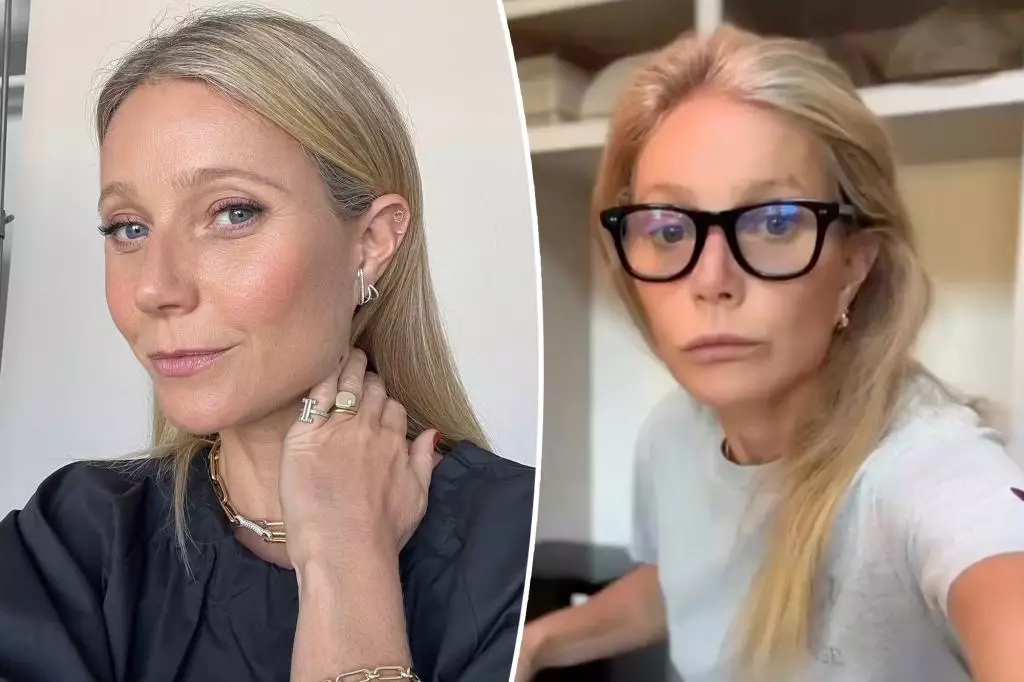In an age obsessed with youth and perfection, celebrities like Gwyneth Paltrow often become unwitting battlegrounds for societal beauty standards. When fans noticed her fuller lips in a casual cooking video, it sparked a wave of scrutiny and curiosity. This phenomenon exemplifies how modern society places immense undue pressure on public figures to maintain an unblemished, ‘natural’ appearance—an unrealistic expectation driven more by social media’s voyeuristic culture than genuine health or beauty concerns. Paltrow’s subtle transformation, whether intentional or not, serves as a mirror reflecting our collective obsession with appearance. It challenges us to reconsider the value we assign to external beauty and the superficial judgments that thrive in digital spaces.
Authenticity Versus Idealization: The Double-Edged Sword of Celebrity Culture
While some fans praised Paltrow’s culinary skills, many fixated solely on her appearance, scrutinizing her lips with a fine-tooth comb. This highlights a broader issue: celebrities are often forced into a paradox. On one hand, they are encouraged to share their authentic selves; on the other, society often demands that they adhere to idealized images. For Paltrow, openly discussing cosmetic procedures might be seen as vulnerable, yet silence only fuels speculation and distrust. Her past candidness about using injectables like Xeomin and Botox reveals a nuanced understanding of aging and societal pressures—but also underscores the uncomfortable dilemma: should celebrities openly admit to enhancing their looks, or is it better to perpetuate an illusion of effortless perfection? The truth is complex, and any attempt at full transparency often invites unnecessary criticism, revealing how fragile genuine authenticity can be in a culture that prizes perfection.
Challenging the Narrative: Is Cosmetic Enhancement a Personal Choice or a Social Mandate?
The reactions to Paltrow’s appearance expose more than mere curiosity; they expose a societal bias that equates aging with inadequacy and superficial beauty with worthiness. Social media comments ranged from innocent admiration to outright mockery, revealing our collective discomfort with aging and natural evolution. Paltrow’s openness about her use of injectables in the past indicates that her choices are personal, yet the relentless scrutiny she endures suggests a culture that equates cosmetic enhancement with a betrayal of authenticity. This raises a critical question: are we truly free to make personal aesthetic choices without being labeled or judged? Or are societal pressures so ingrained that any deviation from ‘natural’ looks warrants public condemnation? This double standard not only impacts celebrities but also influences everyday perceptions of health and beauty, creating an environment where authenticity is sacrificed for societal acceptance.
The Cost of Maintaining a Flawless Image: The Hidden Toll
Behind her curated image, Paltrow’s candor about her past negative experiences with Botox reveals the emotional and physical toll that striving for a youthful visage can impose. Her admission that Botox left her feeling alienated from herself underscores a vital reality: the pursuit of perfection often leads to dissatisfaction and internal conflict. Society’s fixation on external appearances diminishes the importance of inner well-being, creating a cycle of insecurity that fuels the cosmetic industry’s profits. Celebrity culture amplifies this dynamic, as stars are celebrated not only for their talent but also for their seemingly ageless looks. Yet, at what cost? The mental health implications of constant scrutiny, the pressure to uphold a certain standard, and the stigma surrounding aging are often overlooked. Paltrow’s narrative reminds us that true beauty encompasses authenticity, vulnerability, and self-acceptance—qualities that cannot be bought or artificially maintained.
Redefining Beauty: Moving Toward a Culture of Acceptance
The ongoing debate around Paltrow’s appearance should serve as a catalyst for broader societal change. Instead of policing choices or fueling gossip, we should challenge the underlying biases that equate youth with beauty and perfection with worthiness. Promoting a culture that embraces aging gracefully and values authenticity over superficial appearances is imperative. Celebrities, wielding significant influence, have the power to shape perceptions significantly. By openly celebrating natural aging and highlighting the diversity of beauty standards, they can help dismantle toxic narratives. Ultimately, beauty is a deeply personal and evolving concept—one that thrives when rooted in self-love and acceptance rather than societal approval. Paltrow’s experience humanizes the dialogue, urging us to question our ingrained notions of perfection and to foster a more compassionate and inclusive definition of beauty.

